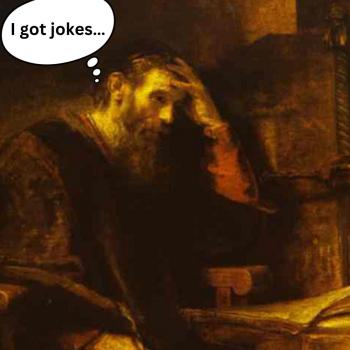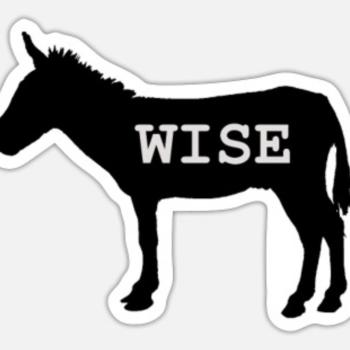“…Myth in general is not merely misunderstood history (as Euhemus thought) nor diabolical illusion (as some of the Fathers thought) nor priestly lying (as the philosophers of the Enlightenment thought) but, at its best, a real though unfocused gleam of divine truth falling on human imagination.” [1.]
When a tsunami hits, the damage to all it comes in contact with is devastating. The deadliest tsunami in recorded history was the 2004 Indian Ocean tsunami, which killed almost 230,000 people in eleven countries. The million dollar question is: Was God the author of this? If you’re not a 5-point Calvinist (sorry but it’s true), then the answer would be no. If this is the case, why would we believe that God sent the tsunami of all tsunamis to wipe out the entire planet?
Did God literally send a flood to exterminate the entire earth except one “obedient” family and a bunch of animals in a boat? And, He did this because he just did a shitty job in creating in the first place, so he felt regret and decided to violently start over (Gen 6:17)? Can we really believe in a God who thinks that the only way to solve a problem is to use coercive power which then produces genocide?
Now, numerous amounts of interpretations have run amok with the good ol’ flood story. From the staunch conservative to the bedlam liberal, both interpretations present an “all or nothing” conclusion. But, do we have to be so dualistic? How about the Jesus proposal: The Third Way? Let’s see where these hermeneutics compare with each other and see which one really brings “abundant life” (John 10:10).
Staunch Conservatism
The majority from this group interpret every single word from Genesis 6 happening literally in history, with exact precession. This type of extremism is know as “wooden” literalism ( or biblical literalism). This “fundamentalism” interpretation has produced some unhealthy world-views which in turn brings about unwise decisions in regards to worldwide issues (colonialism, slavery, war, environmental destruction, etc.).
Rob Bell has a great quote from his book: What is the Bible, in regards to how biblical literalism leads to missing the point:
“Arguing about how it literally happened can be an easy way to avoid facing the people in your life you need to forgive. For the people who first heard this story, the story would have had a provocative, unsettling effect. The Assyrians? The Assyrians were like a huge, gaping, open wound for the Israelites. Bless the Assyrians? The story is extremely subversive because it insists that your enemy may be more open to grace and love than you are.“[2.]
So, what are we missing from the flood story that could help us maybe step into of the reality of love for God and man? Or how about experiencing the essence of the Divine which transforms the world upside down? Not by violently destroying creation, but giving it an amazing light of hope for something new?
Bedlam Liberalism
On the other side of the coin of interpreting the Genesis flood story is just throwing out the whole thing all together. “It’s just a mumbo-jumbo fable” with no truth to it whatsoever. This conclusion comes from an scientific and historical lens due to the discrepancies we find in the flood account. The two major factors are:
– There has never been a global flood that covered the entire earth.
– All modern animals and humans do not descend from the passengers of a single vessel.[3.]
This is all true. The Atheist/Skeptic have valid reasons to push back on the flood myth with these types of discoveries. But, here’s the thing: Is this what the ancient Jewish writers were trying to portray with the flood story? I think not. Flood stories were a big theme in ancient culture. The running message through all these flood stories were that the gods were pissed at creation (for really just being to noisy and annoying) so they decided to wipe them out, except a few, to show them who’s boss. In the end, these flood stories represented fear tactics to have creation follow the rules or else be eliminated.
Thus, we have many groups of interpreters look at the Noah flood story and see no differences from the rest of the ancient flood stories. So, to them, it’s all bogus and it is where it belongs: The mythical trash bin…
Jesus: The Third Way
“You have heard that it was said, ‘You shall love your neighbor and hate your enemy.’ But I say to you, Love your enemies and pray for those who persecute you, so that you may be children of your Father in heaven; for he makes his sun rise on the evil and on the good, and sends rain on the righteous and on the unrighteous.” Matthew 5:43-45
I think Jesus puts this whole flood story into perspective with the Agape Repercussion. The way we interpret scripture is through the lens of Christ: The true Word of God (John 1:1…yelloooo). Jesus loves his enemies and says turn the other cheek. Jesus declared that God brings rain on the righteous and unrighteousness. If Jesus is the true manifestation of God, then the God in the flood story–who endorses genocide–just doesn’t resemble the enemy loving Christ.
I think the biggest hurdle besides having the Christocentric lens, is the term–myth. It’s not merely a tall tale, but a story of truthful moral issues needing a solution. Let’s look at what C.S. Lewis says in regards to myth and its relation to Christ:
Now the story of Christ is simply a true myth: a myth working on us the same way as the others, but with this tremendous difference that it really happened: and one must be content to accept it in the same way, remembering that it is God’s myth where the others are men’s myths: i.e., the Pagan stories are God expressing Himself through the minds of poets, using such images as He found there, while Christianity is God expressing Himself through what we call ‘real things‘.[4.]
The “real things”, in my opinion, that Lewis is pointing to is the love of God as seen in Jesus. What Christ actually does is give us the new hermeneutic (via The Holy Spirit) which defines reality through myth. In other words, what is real is how we love others.
French Anthropologist René Girard brings this concept of myth out even further to not just pagan stories, but through the Bible itself. Girardian theologian, Adam Ericksen, points this out in regards to the Genesis flood account:
“Girard calls the Bible “a text in travail.” It’s a text that struggles with this idea of myth. We see that struggle in the Genesis account. It doesn’t cover up the fact that the evil of violence is humanity’s biggest problem. Genesis 6:5 states, “The Lord saw that the wickedness of humankind was great in the earth, and that every inclination of the thoughts of their hearts was only evil continually.” While Genesis doesn’t cover up the problem of human violence, it still projects violence onto God. For Girard, that projection is a mythical element of the story. Girard spent his career showing us that the god of violence belongs solely to world of myth.”[5.]
To that, I say: Look to Jesus! He came to reveal that all the myth of violence was not Gods doing but of human beings! As Gen 6:11 states, we are the ones that were showering the world with violence. Also, later on through the Hebrew scriptures, we see the book of Daniel describe violence as a flood – “shall wage war and assemble a multitude of great forces, which shall advance like a flood and pass through, and again shall carry the war as far as his [enemy’s] fortress.” (Dan 11:10).
As we can see as revelation through scripture develops, it’s reaping what we sow (Gal 6:7-9) that brings about destruction, NOT the Abba of Jesus. So what’s Gods solution to this catastrophic problem? JESUS–The True Ark–that brings grace, mercy, forgiveness and truth which saves us from our flood of violence. Enemy love is what saves the world not enemy inflicted wrath. Resurrection (abundant life) can only blossom when love reveals its face in the most dire of circumstances.
Do we really think violence will rid the world of violence? Have any of the wars produced an everlasting peace? No! It’s the fruit of the Spirit that brings shalom (Gal 5:22-23). What makes the flood story of the Bible stand out from the rest is we see a rainbow of new hope. A promise from God to creation! This was absent and totally foreign from all the other flood myths. The Jewish people brought a whole new idea when it came to the Creator: This is an relational God wanting to have in-depth intimacy with Her offspring.
God is not against us but for us! What we can take from this ancient story is that the Divine Maker of the universe is not here to destroy it. Instead, God is making all things new through love, mercy, grace and forgiveness. This is what being a new creation in Christ is all about…
“Noah’s ark is not meant to be a cute children’s story; it is a mature metaphor for the People of God on the waves of time, carrying the contradictions, the opposites, the tensions, and the paradoxes of humanity—preserving and protecting diversity inside of a safe unity created by God.”[6.]












